《PRINCIPLES OF PUBLIC INTERNATIONAL LAW THIRD EDITION》
| 作者 | IAN BROWNLIE 编者 |
|---|---|
| 出版 | 未查询到或未知 |
| 参考页数 | |
| 出版时间 | 没有确切时间的资料 目录预览 |
| ISBN号 | 无 — 求助条款 |
| PDF编号 | 820553438(仅供预览,未存储实际文件) |
| 求助格式 | 扫描PDF(若分多册发行,每次仅能受理1册) |
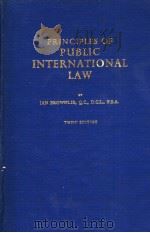
PART Ⅰ PRELIMINARY TOPICS1
Ⅰ. SOURCES OF THE LAW1
1. Introductory1
2. The Statute of the International Court of Justice3
3. International Custom4
4. ‘Lawmaking' Treaties and Other Material Sources12
5. General Principles of Law15
6. General Principles of International Law19
7. Judicial Decisions20
8. The Writings of Publicists25
9. Equity in Judgments and Advisory Opinions of the Inter-national Court27
10. Considerations of Humanity29
11. Legitimate Interests30
Note on Comity31
Note on Codification31
Ⅱ. THE RELATION OF MUNICIPAL AND INTER-NATIONAL LAW33
1. Theoretical Problems 33
2. Theories of Co-ordination36
3. The Relation between Obligations of States and Municipal Law36
4. The Position of the Individual38
5. Issues of Municipal Law before International Tribunals39
6. Municipal Laws as ‘Facts' before International Tribunals41
7. Issues of International Law before Municipal Courts44
8. The Doctrine of Incorporation in British and Common-wealth Courts45
9. Treaties and the Interpretation of Statutes in the United Kingdom50
10. The Reception of International Law in Other States52
11. Relation of Executive and Judiciary54
12. Res fudicata and the Two Systems55
13. Relation to the Sources of International Law57
14. Conclusion58
PART Ⅱ PERSONALITY AND RECOGNITION60
Ⅲ. SUBJECTS OF THE LAW60
1. Introductory60
2. Personality and Protected Status62
3. Established Legal Persons62
4. Special Types of Personality66
5. Controversial Candidatures69
6. Some Consequences71
7. Problems of Choice of Law72
Ⅳ. INCIDENCE AND CONTINUITY OF STATE-HOOD73
1. Introductory73
2. Legal Criteria of Statehood74
3. States in Siatu Nascendi82
4. Illegal Occupation and the Influence of Fus Cogens82
5. Necessary Legal Constructions83
6. Membership of International Organizations and Agencies84
7. Identity and Continuity of States84
8. Micro-States88
Ⅴ. RECOGNITION OF STATES AND GOVERNMENTS89
1. Recognition as a General Category89
2. States and Governments in Relation to Recognition90
3. The Varied Legal Consequences of Acts of Recognition and Policies of Non-Recognition93
4. Is there a Duty of Recognition?94
5. Recognition of Governments95
6. De Jure and De Facto Recognition96
7. Retroactivity97
8. Implied Recognition98
9. Collective Recognition: Membership of Organizations99
10. Non-Recognition and Sanctions100
11. Issues of Recognition before National Courts101
PART Ⅲ TERRITORIAL SOVEREIGNTY109
Ⅵ. TERRITORIAL SOVEREIGNTY109
1. The Concept of Territory109
2. Sovereignty and Jurisdiction109
3. Sovereignty and Ownership110
4. Administration and Sovereignty111
5. Sovereignty and Responsibility. The Ownership of Rights111
6. Administration Divorced from State Sovereignty112
7. Territory the Sovereignty of which is Indeterminate112
8. Terminable and Reversionary Rights113
9. Residual Sovereignty114
10. International Leases115
11. Use and Possession Granted in Perpetuity116
12. Demilitarized and Neutralized Territory117
13. The Concept of Territory: the Principle of Effective Control Applied by National Courts117
14. Condominia118
15. Vassalage, Suzerainty, and Protection119
16. Mandates and Trust Territories120
17. Parts of State Territory120
18. Restrictions on Disposition of Territory123
19. Capatity to Transfer or Acquire Territory125
20. The Concept of Title126
21. The Determination of Frontiers127
22. Nemo dat quod non habet128
Ⅶ. THE CREATION AND TRANSFER OF TERRITOR-IAL SOVEREIGNTY130
1. Introducto130
2. Historical Changes in Concepts of Law131
3. The Doctrine of Inter-Temporal Law131
4. Critical Dates133
5. The Modes of Acquisition134
6. Original and Derivative Title135
7. Roots of Title136
8. Effective Occupation141
9. Abandonment or Derelictio148
10. Discovery149
11. Papal Grants150
12. Symbolic Annexation151
13. Extent of Sovereignty: Geographical Doctrines153
14. Arctic and Antarctic Sectors154
15. Accretion, Erosion and Avulsion155
16. Acquisitive Prescription156
17. Acquiescence and Recognition163
18. Estoppel164
19. Novation165
20. Doctrine of Reversion166
21. Relative Title166
22. Historical Consolidation of Title168
23. Acquisition of Maritime Territory and Other Topics170
24. Problems of Alienability173
Ⅷ. STATUS OF TERRITORY: FURTHER PROBLEMS175
1. International Procedures Relating to Territorial Dispositions175
2. Capacity of the United Nations to Administer Territory178
3. Legal Regimes apart om State Sovereignty179
PART Ⅳ LAW OF THE SEA183
Ⅸ. TERRITORIAL SEA, CONTIGUOUS ZONES, AND ANALOGOUS CLAIMS183
A. Territorial Sea183
1. Introductory183
2. Baseline for Measurement of the Territorial Sea186
3. Straight Baselines: Recent Developments190
4. Breadth of the Territorial Sea191
5. Is Delimitation a Liberty of Coastal States?194
6. The Present Legal Regime196
7. Attempts to Establish a Uniform Breadth by Multilateral Convention197
8. Baselines: Further Problems199
9. Legal Regime of the Territorial Sea203
B. Specialized Righis over the High Seas209
1. Introductory209
2. The Concept of the Contiguous Zone210
3. Permissible Types of Zone211
4. Delimitation of the Contiguous Zone215
5. Problems of Enforcement215
6. Other Zones for Special Purposes217
Ⅹ. SUBMARINE AREAS: CONTINENTAL SHELF,SEABED, AND OCEAN FLOOR222
1. Classification of Submarine Areas222
2. Continental Shelf222
3. Seabed and Ocean Floor233
4. Special Cases236
Ⅺ. THE REGIME OF THE HIGH SEAS237
1. Introductory237
2. The Freedom of the High Seas238
3. The Maintenance of Order on the High Seas242
4. Exceptions to the Principle ofthe Freedom of the High Seas243
5. Jurisdiction over Ships on the High Seas254
6. Oil Pollution Casualties and ‘Pirate' Radio255
PART Ⅴ COMMON AMENITIES AND CO-OPERATION IN THE USE OF RESOURCES258
Ⅻ. COMMON AMENITIES AND CO-OPERATION IN THE USE OFRESOURCES258
1. Introduction258
2. Economic Aid259
3. Access to Resources: the Peaceful Uses of Atomic Energy261
4. Reatrictive Practices262
5. Conservation of the Living Resources of the High Seas263
6. Antarctica265
7. Outer Space266
8. International Rivers270
9. Canals275
10. Straits279
11. Land locked States and Enclaves283
12. Extra-Hazardous Activities and Problems of Neighbourhood285
13. The International Sea-bed Area286
PART Ⅵ STATE JURSDICTION287
ⅩⅢ. SOVEREIGNTY AND EQUALITY OF STATES287
1. In General287
2. Sovereignty and the Application of Rules288
3. Sovereignty and Legal Personality289
4. Sovereignty and Competence289
5. Membership of Organizations290
6. The Reserved Domain of Domestic Jurisdiction291
7. Article 2, Paragraph 7, of the United Nations Charter293
8. International Tribunals and the Plea of Domestic Jurisdic-tion295
ⅩⅣ.JURISDICTIONAL COMPETENCE298
1. In General298
2. Civil Jurisdiction298
3. Criminal Jurisdiction299
4.The Relations of the Separate Principles305
5. Extra-territorial Enforcement Measures306
6. A General View of the Law309
7. Cognate Questions, Including Extradition314
8. Special Cases of Concurrent Jurisdiction316
ⅩⅤ. PRIVILEGES AND IMMUNITIES OF FOREIGN STATES321
1. Introductory321
2. The Distinction between Non-justiciability and Immunity as a Jurisdictional Bar322
3. The Rationale of Jurisdictional Immunity325
4. State Immunity: Controversy over its Extent326
5. The Distinction between Acts Fure Imperii and Fure Gestionis330
6. Some Questions of Policy and Principle332
7. The European Convention on State Immunity334
8. The Evolution of the English Cases336
9. Waiver of Immunity339
10. The Principle of Reciprocity340
11. Other Exceptions to the Principle of Immunity340
12. Political Subdivisions and State Agencies341
13. Jurisdictional Immunities: Treaty Provisions343
14. Attachment and Seizure in Execution343
15. Specialized Privileges and Immunities344
ⅩⅥ. DIPLOMATIC AND CONSULAR RELATIONS345
1. Diplomatic Relations: Introductory345
2. General Legal Aspects of Diplomatic Relations346
3. Staff, Premises, and Facilities of Missions348
4. Inviolability of Missions351
5. Inviolability of Diplomatic Agents353
6. Personal Immunities from Local Jurisdiction354
7. Immunity from Jurisdiction for Official Acts (Ratione Materiae)356
8. Immunity om Application of Certain Local Laws357
9. Some other Aspects of Immunity357
10. Consular Relations359
11. Special Missions362
12. The Prevention and Punishment of Crimes against Inter-nationally Protected Persons362
ⅩⅦ. RESERVATIONS FROM TERRITORIAL SOVE-REIGNTY364
1. Territorial Privileges by Concession364
2. Other Restrictions on Territorial Supremacy375
3. External Imposition of Governmental Functions without the Consent of the Sovereign376
4. The Regulation of Rights376
PART Ⅶ RULES OF ATTRIBUTION (APART FROM TERRITORIAL SOVEREIGNTY AND STATE JURISDICTION)380
ⅩⅧ. THE RELATIONS OF NATIONALITY380
1. The Doctrine of the Freedom of States in Matters of Nation-ality380
2. Opinions of Governments on the Iasue of Autonomy383
3. The Convention Concerning Certain Questions Relating to the Conflict of Nationality Laws385
4. Nationality Rules Commonly Adopted by States385
5. Legal Status of the ‘General Principles'392
6. The Logical Application of Rules of International Law394
7. State Responsibility and the Doctrine of the Genuine Link396
8. Nationality of Claims398
9. Diplomatic Protection401
10. Nationality by Estoppel403
11. Compulsory Change of Nationality404
12. The Functional Approach to Nationality405
13. The Principle of Effective Link and the Judgment in the Nottebohm Case406
ⅩⅨ. SOME RULES OF ATTRIBUTION: CORPORA-TIONS AND SPECIFIC ASSETS421
1. General Aspects421
2. Corporations421
3. Ships424
4. Aircraft426
5. Space Vehicles428
6. Property in General428
7. Assets of International Organizations429
PART Ⅷ THE LAW OF RESPONSIBILITY431
ⅩⅩ. THE RESPONSIBILITY OF STATES431
1. The Relations of the Subject431
2. The Basis and Nature of State Responsibility431
3. Boundaries of Responsibility435
4. Objective Responsibility436
5. Calpa439
6. Intention and Motive440
7. The Individuality of Issues: the Corfu Chasscl Case441
8. Liability for Lawful Acts. Abuse of Rights443
9. Responsibility for the Acts of State Organs, Offcials, Revolu-tionaries, and Others445
10. Agency and Joint Tortfeasors454
11. The Types of Damnum and the Forms and Function of Reparation457
12. Compensation, Damages (Dommages-Interets)463
13. Justifications464
14. The Nature of a Legal Interest: Locus Standi466
15. Causes of Action473
16. Control of Discretionary Powers475
17. Ultra-hazardous Activities476
ⅩⅪ. THE ADMISSIBILITY OF STATE CLAIMS478
1. Introductory478
2. Diplomatic Negotiations479
3. Legal Disputes479
4. Absence of a Legal Interest of the Plaintiff480
5. Diplomatic Protection: the Nationality of Claims480
6. Exhaustion of Local Remedies495
7. Extinctive Prescription505
8. Waiver of Claims 506
9. Other Grounds of Inadmissibility 506
10. Counter-claims507
11. Foreign Acts of State in Municipal Courts507
ⅩⅫ. SOME INCIDENTS OF ILLEGALITY AND THE CONCEPT OF JUS COGENS509
1. The Varying Content of Iegality509
2. Objective Consequences of Illegal Events510
3. General Wrongs: Abuse of State Competence510
4. Ex injuria non oritur jus511
5. Fus Cogens512
6. The Obligation of Putting an End to an Illegal Situation515
PART Ⅸ THE PROTECTION OF INDIVIDUALS AND GROUPS518
ⅩⅩⅢ. INJURY TO THE PERSONS AND PROPERTY OF ALIENS ON STATE TERRITORY518
1. State and Individual518
2. Admission, Expulsion, and Liabilities of Aliens519
3. General Principles521
4. The Standard of National Treatment523
5. The International Minimum Standard524
6. The Two Standards in Perspective525
7. Relevant Forms of Delictual Responsibility528
8. Denial of Justice529
9. Expropriation of Foreign Property531
10. The Compensation Rule533
11. The Principle of National Treatment536
12. Control of Major National Resources537
13. Expropriation Unlawful per se538
14. The General Assembly Resolution of 1962 on Permanent Sovereignty over Natural Resources540
15. The Charter of Economic Rights and Duties of States541
16. Conclusions on Expropriation543
17. Legal Devices Adopted by Investors and Hosts to Foreign Capital545
18. Breaches and Annulment of State Contracts547
19. Foreign Investment Agreements551
ⅩⅩⅣ. THE PROTECTION OF INDIVIDUALS AND GROUPS: HUMAN RIGHTS AND SELF-DETER-MINATION552
1. Sovereignty and Domestic Jurisdiction552
2. Rights Conferred by Treaty553
3. The Individual and the State554
4. Nationality and the Concept of Territory.559
5. The Individual as Representative and Agent560
6. The Individual and International Criminal Responsibility561
7. International Protection of Human Rights564
8. Recent Developments576
9. The Individual before Tribunals Exercising International Jurisdiction577
10. The Principle of Self-Determination593
11. The Standard of Non-discrimination596
12. Evaluation and Synthesis598
PART Ⅹ INTERNATIONAL TRANSACTIONS600
ⅩⅩⅤ. THE LAW OF TREATIES600
1. Introductory600
2. Conclusion of Treaties602
3. Reservations605
4. Entry into Force, Deposit, and Registration608
5. Invalidity of Treaties610
6. Termination and Suspension of Treaties613
7. Invalidity, Termination, and Suspension: General Rules618
8. Application and Effects of Treaties619
9. Amendment and Modification of Treaties622
10. Interpretation of Treaties623
11. Classification of Treaties630
12. Participation in General Multilateral Treaties631
ⅩⅩⅥ. OTHER TRANSACTIONS: AGENCY AND REPRE-SENTATION633
1. Informal Agreements633
2. Quasi-Legislative Acts633
3. Unilateral Acts634
4. Estoppel (Preclusion)637
5. Agency and Representation639
ⅩⅩⅦ. TECHNIQUES OF SUPERVISION AND PROTEC-TION641
1. Introductory641
2. Reporting Procedures641
3. Fact-finding Bodies642
4. Political Supervision642
5. Complaints Procedures apart from Adjudication643
6. Judicial Supervision645
7. Quasi-judicial Bodies646
8. Negotiation and Conciliation647
9. Other Control Procedures647
10. The Types of Rules647
11. Problems of Co-ordination: Regional Bodies648
12. Certain Other Issues: Inspection Procedures649
PART Ⅻ TRANSMISSION OF RIGHTS AND DUTIES651
ⅩⅩⅧ. STATE SUCCESSION651
1. State Succession as a Category651
2. The Pre-emption of Problems by Treaty, Acquiescence, and Estoppel652
3. Territorial Sovereignty and Domestic Juriediction653
4. The Interaction of Rules of Law658
5. Particular Legal Issues658
6. Relevance of the Political Form of Territorial Change671
7. Doctrine of Reversion672
ⅩⅩⅨ. OTHER CASES OF TRANSMISSION OF RIGHTS AND DUTIES674
1. Succession between International Organizations674
2. Cases of Ageney675
3. Assignment676
PART Ⅻ INTERNATIONAL ORGANIZATIONS AND TRIBUNALS677
ⅩⅩⅩ. INTERNATIONAL ORGANIZATIONS677
1. Introductory677
2. Legal Personality677
3. Performance of Acts in the Law681
4. Interpretation of the Constituent Instrument: Inherent and Implied Powers686
5. Relations with Member States688
6. The Functional Concept of Membership690
7. Relations with States not Members691
8. Relations between Organizations692
9. Relation to Municipal Law694
10. Law-making by Organizations695
11. Control of Acts of Organizations698
ⅩⅩⅪ. THE JUDICIAL SETTLEMENT OF INTERNA-TIONAL DISPUTES705
1. Peaceful Settlement in General705
2. Arbitration706
3. Permanent Court of Arbitration707
4. Codes of Arbitral Procedure708
5. Judicial Settlement709
6. The Permanent Court of International Justice and the Inter-national Court of Justice712
7. Organization of the Court713
8. Jurisdiction of the Court in Contentious Cases716
9. Heads of Jurisdiction719
10. The Advisory Jurisdiction of the Court728
11. An Evaluation of the Court730
INDEX735
《PRINCIPLES OF PUBLIC INTERNATIONAL LAW THIRD EDITION》由于是年代较久的资料都绝版了,几乎不可能购买到实物。如果大家为了学习确实需要,可向博主求助其电子版PDF文件。对合法合规的求助,我会当即受理并将下载地址发送给你。
高度相关资料
-

- THE ELEMENTS OF INTERNATIONAL LAW THIRD EDITION
- 1908 HARPER AND BROTHERS PUBLISHERS
-
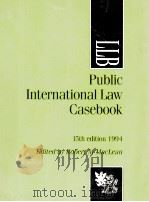
- Public international law caseboo
- 1994 HLT publications
-
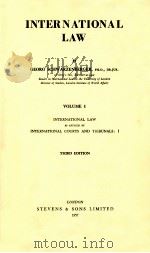
- INTERNATIONAL LAW VOLUME 1 THIRD EDITION
- 1957 STEVENS & SONS LIMITED
-
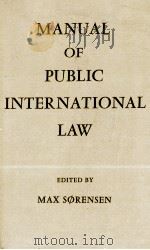
- MANUAL OF PUBLIC INTERNATIONAL LAW
- 1968 THE MACMILLAN PRESS LTD
-

- ENCYCLOPEDIA OF PUBLIC INTERNATIONAL LAW 10
- 1987 NORTH-HOLLAND
-
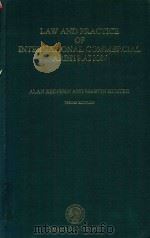
- Law and Practice of International Commercial Arbitration Third Edition
- 1999 Sweet & Maxwell
-

- THE LAW OF INTERNATIONAL INSTITUTIONS THIRD EDITION
- 1975 STEVENS & SONS
-
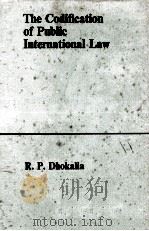
- THE CODIFICATION OF PUBLIC INTERNATIONAL LAW
- 1970 MANCHESTER UNIVERSITY PRESS
-
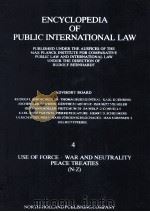
- ENCYCLOPEDIA OF PUBLIC INTERNATIONAL LAW 4
- 1982 NORTH-HOLLAND PUBLISHING COMPANY
-

- ENCYCLOPEDIA OF PUBLIC INTERNATIONAL LAW 3
- 1982 NORTH-HOLLAND PUBLISHING COMPANY
-
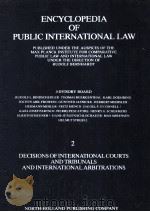
- ENCYCLOPEDIA OF PUBLIC INTERNATIONAL LAW 2
- 1981 NORTH-HOLLAND PUBLISHING COMPANY
-
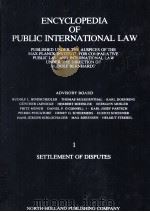
- ENCYCLOPEDIA OF PUBLIC INTERNATIONAL LAW 1
- 1981 NORTH-HOLLAND PUBLISHING COMPANY
-

- THE PRINCIPLES OF INTERNATIONAL LAW SEVENTH EDITION
- 1923 MACMILLAN AND CO.
-

- A HANDBOOK OF PUBLIC INTERNATIONAL LAW TENTH EDITION
- 1927 MACMILLAN AND CO.
-
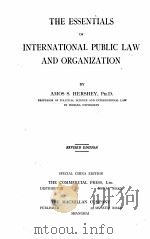
- THE ESSENTIALS OF INTERNATIONAL PUBLIC LAW AND ORGANIZATION REVISED EDITION
- 1927 THE MACMILLAN COMPANY
提示:百度云已更名为百度网盘(百度盘),天翼云盘、微盘下载地址……暂未提供。➥ PDF文字可复制化或转WORD